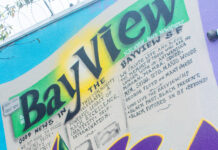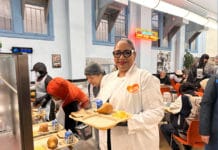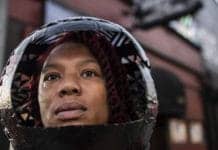by Kenneth Hill, Jazz Vassar and Antonia Williams for the SEFA Food Guardians

The inability to access fresh and affordable produce in San Francisco’s Bayview Hunters Point district is an unfortunate reality residents face daily. In Bayview the availability of fresh produce is limited and is outweighed by fast food chains, fried chicken joints and liquor stores selling a variety of unhealthy sugary and salty snacks.
This is not the reality in most neighborhoods in San Francisco. In contrast, residents of the Sunset district enjoy an abundance of fresh produce in their neighborhood. Sunset residents have access to more than eight produce markets within their district that offer a variety of fresh, organic, sustainable and culturally appropriate produce. In addition, there are a variety of Asian- and American-style full service supermarkets, with bulk sections of grains and beans, and meat counters with an assortment of select grade meats.
In Bayview the availability of fresh produce is limited and is outweighed by fast food chains, fried chicken joints and liquor stores selling a variety of unhealthy sugary and salty snacks. Sunset residents have access to more than eight produce markets within their district that offer a variety of fresh, organic, sustainable and culturally.
It’s clear that the lack of access to fresh, healthy foods has had a negative impact on the health of Bayview Hunters Point residents. Compared to other San Francisco districts, Bayview residents have far less access to fresh produce and healthy foods and suffer from diet-related diseases such as diabetes and heart disease at disproportionately high rates. SEFA, a coalition of community residents, community based organizations and City agencies, convened in 2007 in an attempt to improve the availability of healthier foods and health outcomes in Bayview Hunters Point.
One way to encourage the availability of healthier foods in Bayview was to develop the SEFA Retail Standards for Health and Sustainability. The SEFA Retail Standards are based on national best practices for what a healthy and sustainable grocery and corner store should look like. We used the SEFA Retail Standards to rate grocery and corner stores on the availability of healthy food items, as well as cleanliness, loitering, local hiring practices and the presence of advertisements for junk food, alcohol and tobacco.
Compared to other San Francisco districts, Bayview residents have far less access to fresh produce and healthy foods and suffer from diet-related diseases such as diabetes and heart disease at disproportionately high rates. One way to encourage the availability of healthier foods in Bayview was to develop the SEFA Retail Standards for Health and Sustainability.
With a packet of standards, a clip board and good luck, the Food Guardians set off to explore the local food stores. The SEFA Retail Standards were used not only to rate the stores, but also to create long lasting partnerships with store owners. The assessments were a great opportunity to introduce store owners to the Food Guardians and tell them about our work.

Given the disparities in the Bayview described above, we weren’t surprised to see that the shelves and coolers of neighborhood stores were often filled with unhealthy products. In our daily lives, many of us never think to really look closely at the ratio of healthy food to junk food around us. Our purpose in rating the stores with SEFA Retail Standards was not to air dirty laundry, but to reveal both the healthy and unhealthy foods available in our community. We are creating knowledge for the people in the community, while also holding stores accountable for their lack of healthy options.
Twenty corner stores and four grocery stores later, the assessments were complete. We then realized the complexity of evaluating the level of food access; e.g.. “Store A has fresh eggs, yet doesn’t accept EBT (Electronic Benefit Transfer debit card for food stamp and public assistance funds). Store B accepts EBT, yet doesn’t have any fresh vegetables or 100 percent whole wheat bread.”
Our purpose in rating the stores with SEFA Retail Standards was not to air dirty laundry, but to reveal both the healthy and unhealthy foods available in our community. “Store A has fresh eggs, yet doesn’t accept EBT (Electronic Benefit Transfer debit card for food stamp and public assistance funds). Store B accepts EBT, yet doesn’t have any fresh vegetables or 100 percent whole wheat bread.”
So we created a scoring system to identify the standards deemed “most desirable” for a healthier store. Corner and grocery stores were rated separately using separate user-friendly apple and grocery bag systems: for corner stores, three apples represented the highest rating and no apples the lowest; whereas the grocery stores with the highest rating received the golden grocery bag rating, then the silver, lastly the bronze. You can see all the store’s results on our website: http://southeastfoodaccess.org/food-guardians/food.
After carefully reviewing the results, we put together informational folders to share with each store owner and encourage them to increase the healthy food sold in their stores, improve the store environment, and help create a more equitable, healthy and sustainable food system for Bayview residents. Each store feedback folder included:
- a handout describing SEFA
- an invitation to our newly launched website with links to the results
- a store results comparison sheet
- the actual SEFA Retail Standards that we used we when visited the store
- two handouts of recommended healthy cereal and snack alternatives
- an individual store sheet with the store’s strengths and suggested areas of improvement
- and finally contact information for the Food Guardians in case of further questions, comments or concerns.



You can do your part by asking for healthier, better quality foods at your local corner and grocery store. We can support local businesses to be a better resource for our community by demanding higher quality, healthier foods and shopping locally to let store owners know these positive changes are appreciated.
Kenneth “Kenny” Hill, a Southeast Food Access (SEFA) Food Guardian, can be reached at Khill@southeastsf.org or (415) 822-7500, ext. 26.

 Store
Store












